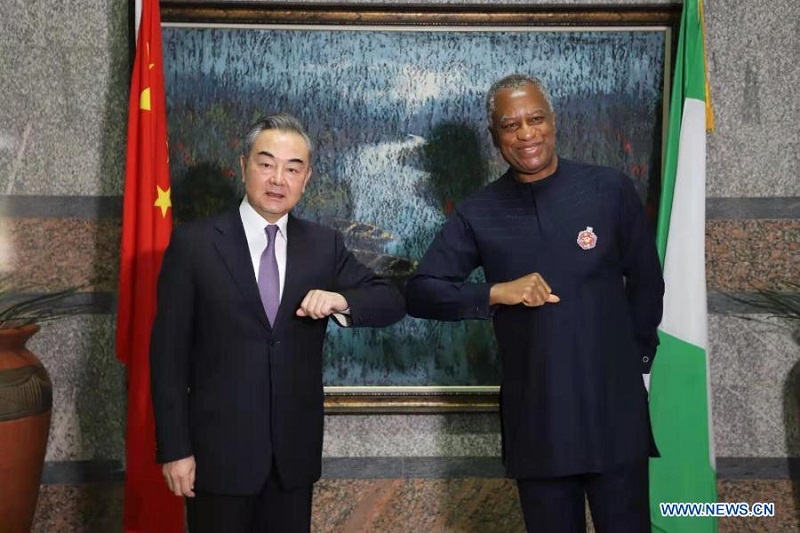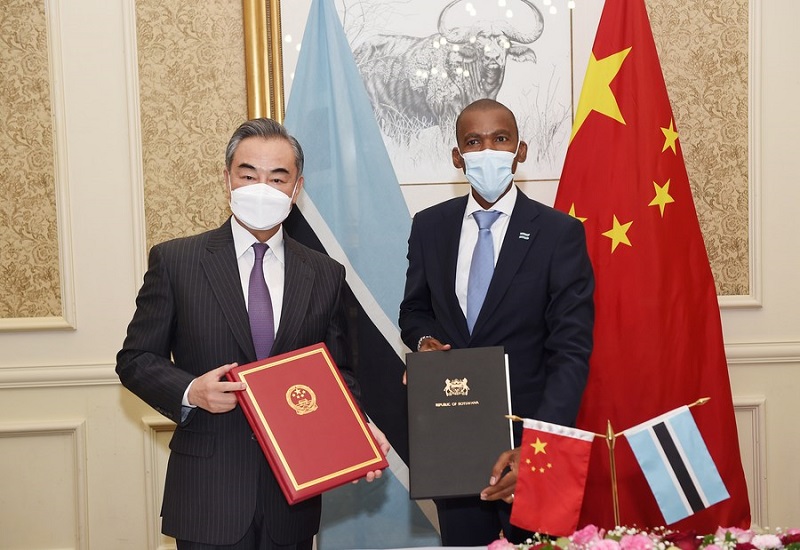Chinese State Councilor and Foreign Minister Wang Yi (L) meets with Nigerian Foreign Affairs Minister Geoffrey Onyeama in Abuja, Nigeria, on Jan. 5, 2021. [Photo/Xinhua]
From Jan. 4-8, Chinese State Councilor and Foreign Minister Wang Yi paid official visits to five African countries – Nigeria, Congo, Botswana, Tanzania and Seychelles. The Chinese foreign minister's new year's trip to Africa has become an unwritten tradition that has taken place annually for the past 31 years.
The global spread of the COVID-19 pandemic has been unable to stop either the Chinese foreign minister's visit or the development of China-Africa friendship. Wang traveled to the continent to discuss the joint fight against the pandemic with African leaders and help boost the traditional friendship in the post-pandemic period.
2021 marks the year in which the outcomes of the 2018 Beijing Summit of the Forum on China-Africa Cooperation (FOCAC) are to be implemented. Wang's visit, therefore, not only involved promoting the "Eight Initiatives" agreed upon at the Beijing Summit and the outcomes of the 2020 Special Summit on China-Africa Solidarity and Epidemic Prevention, but also exchanging views on preparations for the 8th FOCAC – to be held in Senegal later this year.
Among the countries Wang visited, Nigeria is the largest economy in Africa and has a population of more than 200 million, while Seychelles is relatively underdeveloped economically and has fewer than 100,000 citizens. The diversity of countries visited will help make the exchange of views between China and Africa at the 8th FOCAC more representative.
During his trip, Wang met with African leaders to discuss vaccine cooperation, economic recovery, transformation and development – three important areas of current and future China-Africa cooperation.
First, in terms of vaccine development cooperation, China is keen to provide all kinds of anti-epidemic support to Africa. In June 2020, China pledged to start construction of the headquarters of the Africa Center for Disease Control and Prevention (CDC) in Addis Ababa, Ethiopia, ahead of schedule. It also promised to work with Africa to implement the "Health Initiative" within the FOCAC framework, accelerate the construction of China-Africa friendship hospitals and cooperation with counterpart hospitals, and jointly build the “China-Africa Health Community.”
In December 2020, construction began on the new China-funded headquarters for the Africa CDC, which will include emergency response center, data center, laboratory, library, press rooms, training center, conference rooms, offices and apartments for expatriate staff. This will significantly improve the Africa CDC’s working conditions and its ability to respond to public health emergencies.
In terms of vaccine provision, the first batch of Chinese-developed vaccines arrived at Cairo International Airport in Egypt on Dec. 11, 2020. Speaking at a news conference, Egyptian Health Minister Hala Zayed said that the arrival of the Chinese vaccines was a historic moment for Egypt and showed the new heights of bilateral relations. She said: "China's vaccine is safe, we have conducted clinical trials, and I am one of the volunteers to get vaccinated. The Chinese vaccine proved successful in clinical trials and received final emergency approval from Egypt's Ministry of Health on Dec. 9."
Second, in terms of economic recovery and transformational development, China-Africa cooperation will also seize the opportunity presented by the official launch of the African Continental Free Trade Area (AfCFTA) on Jan. 1. This will further promote the interface between the Belt and Road Initiative (BRI) and Africa's development.
In December 2020, China and the African Union (AU) signed the Cooperation Plan on Jointly Promoting the Construction of the Belt and Road Initiative, which became the first cooperation document signed by China and regional organizations to jointly build the BRI. According to the plan, China will promote docking with the AU's Strategic Framework for Vision 2063; strengthen cooperation with African countries in the fields of railways, highways, regional aviation and industrialization; promote integration with African countries; jointly address the challenges of globalization; and promote the high-quality development of the BRI.
Visiting Chinese State Councilor and Foreign Minister Wang Yi (L) and his Botswana counterpart Lemogang Kwape attend a signing ceremony in Gaborone, Botswana, Jan. 7, 2021. [Photo/Xinhua]
The launch of the AfCFTA and the formation of a large market for African unity could also assist the development of China-Africa trade. Looking ahead, China-Africa economic and trade cooperation in the post-pandemic period will promote China's free trade negotiations with more African countries and sub-regional organizations to help transform and upgrade China-Africa trade.
During his visit, Wang also signed a memorandum of understanding on the joint construction of the BRI with Congo and Botswana, making the countries the 45th and 46th partners in Africa to participate in the Belt and Road cooperation.
Although the COVID-19 pandemic has impacted China-Africa economic cooperation, the complementary economic structure formed by China's technology, capital, development experience with African markets, resources and development potential has not changed. With the continued recovery of supply and production chains, China-Africa cooperation is expected to quickly return to its peak. Wang's latest trip to Africa has helped renew friendship following the challenges of the pandemic and has created a brilliant roadmap for future China-Africa cooperation.
He Wenping is senior research fellow with the Charhar Institute and Institute of West Asian and African Studies at the Chinese Academy of Social Sciences.
Opinion articles reflect the views of their authors, not necessarily those of China.org.cn.
If you would like to contribute, please contact us at opinion@china.org.cn.
Follow China.org.cn on Twitter and Facebook to join the conversation.

